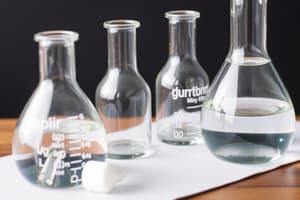Podcast
Questions and Answers
Which of the following is a characteristic of a physical change?
Which of the following is a characteristic of a physical change?
- Major energy changes involved
- Involvement of rearrangement of atoms
- Reversibility under certain conditions (correct)
- Formation of a new substance
Which property describes a substance's ability to dissolve in another substance?
Which property describes a substance's ability to dissolve in another substance?
- Melting point
- Density
- Conductivity
- Solubility (correct)
What is the boiling point of water at standard atmospheric pressure?
What is the boiling point of water at standard atmospheric pressure?
- 50°C
- 0°C
- 100°C (correct)
- 75°C
Which of these is not classified as a physical property?
Which of these is not classified as a physical property?
Which of the following is an example of a chemical change?
Which of the following is an example of a chemical change?
Flashcards are hidden until you start studying
Study Notes
Examples of Physical Properties
- Color: The visual appearance of a substance (e.g., blue, red).
- Odor: The scent or smell of a substance (e.g., floral, pungent).
- Density: Mass per unit volume (e.g., water has a density of 1 g/cm³).
- Melting Point: Temperature at which a solid becomes a liquid (e.g., ice melts at 0°C).
- Boiling Point: Temperature at which a liquid becomes a gas (e.g., water boils at 100°C).
- Solubility: Ability of a substance to dissolve in another (e.g., salt in water).
- State of Matter: Physical form (solid, liquid, gas).
- Conductivity: Ability to conduct electricity or heat (e.g., metals like copper).
Differences Between Physical and Chemical Changes
-
Definition:
- Physical Change: A change affecting one or more physical properties, no new substances formed.
- Chemical Change: A process where substances transform into different substances, involving a rearrangement of atoms.
-
Examples:
- Physical Change: Melting ice, boiling water, dissolving sugar in water.
- Chemical Change: Rusting iron, burning wood, rotting fruit.
-
Reversibility:
- Physical Change: Often reversible (e.g., freezing and melting).
- Chemical Change: Usually irreversible (e.g., combustion).
-
Energy Changes:
- Physical Change: Minor energy changes (e.g., heating ice).
- Chemical Change: Significant energy changes (e.g., heat release or absorption during reactions).
Examples of Chemical Properties
- Reactivity: How a substance reacts with other substances (e.g., iron with oxygen to form rust).
- Flammability: Ability to ignite and burn (e.g., gasoline).
- Acidity/Basicity: Ability to donate protons (acids) or accept protons (bases), measured by pH (e.g., hydrochloric acid).
- Corrosiveness: Ability to damage or destroy other materials (e.g., acids corroding metals).
- Toxicity: Potential to cause harm to living organisms (e.g., poison).
- Oxidation States: The degree of oxidation of an atom in a compound, indicating its reactivity (e.g., oxidation of carbon in combustion).
Physical Properties
- Color: Describes the visual appearance of a substance, such as blue or red.
- Odor: Refers to the scent or smell associated with a substance, for instance, floral or pungent notes.
- Density: Indicates mass per unit volume; water has a density of 1 g/cm³.
- Melting Point: The temperature at which a solid converts to a liquid, exemplified by ice melting at 0°C.
- Boiling Point: The temperature at which a liquid turns into gas; water boils at 100°C.
- Solubility: The capacity of a substance to dissolve in another, like salt dissolving in water.
- State of Matter: Defines the physical form of a substance, categorized as solid, liquid, or gas.
- Conductivity: The ability of a material to conduct electricity or heat, with metals like copper being good conductors.
Differences Between Physical and Chemical Changes
- Definition:
- Physical Change: Involves changes affecting one or more physical properties without forming new substances.
- Chemical Change: Involves a transformation where substances become different entities due to rearrangement of atoms.
- Examples:
- Physical Change: Includes melting ice, boiling water, and dissolving sugar in water.
- Chemical Change: Encompasses rusting of iron, burning wood, and rotting fruit.
- Reversibility:
- Physical Change: Often reversible actions, such as freezing and melting processes.
- Chemical Change: Generally irreversible, exemplified by combustion.
- Energy Changes:
- Physical Change: Usually involves minor energy changes like heating ice.
- Chemical Change: Associated with significant energy changes, including heat release or absorption during reactions.
Chemical Properties
- Reactivity: Describes how a substance interacts with other substances, such as iron reacting with oxygen to produce rust.
- Flammability: Indicates the ability of a substance to ignite and burn, exemplified by gasoline.
- Acidity/Basicity: Represents a substance's ability to donate protons (acids) or accept protons (bases), measured via pH; for example, hydrochloric acid is a strong acid.
- Corrosiveness: Refers to the capacity of a substance to damage or destroy other materials, often seen with acids corroding metals.
- Toxicity: Indicates the potential of a substance to harm living organisms, exemplified by poisons.
- Oxidation States: Reflects the degree of oxidation of an atom within a compound, providing insight into its reactivity, such as the oxidation of carbon during combustion.
Studying That Suits You
Use AI to generate personalized quizzes and flashcards to suit your learning preferences.




